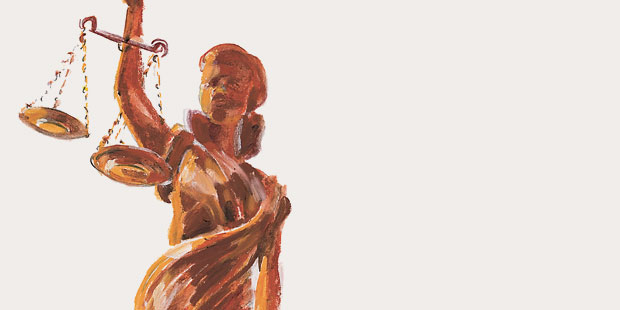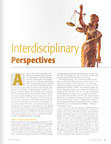Interdisciplinary Perspectives
Printer Friendly VersionAnother aspect of the scholarship of the criminal law faculty that truly stands out is its interdisciplinary reach. The challenges currently confronting the criminal justice system are not the kind that can be resolved solely by analyzing the latest U.S. Supreme Court slip opinions. The NYU School of Law has long recognized that perspectives from disciplines other than the law are essential to understanding, for example, how to balance civil liberties against national security needs, or questions like: Which policing methods are most effective and how do they measure up in terms of building trust and cooperation in diverse communities? What are the consequences of mass incarceration on crime and on American society? Should failings of corporate governance be resolved by private ordering, civil regulation, or criminal prosecution? How does one mediate between the uses of technology as an instrument of criminality and a crime-fighting tool? What are the ramifications of the increasing privatization of criminal justice? The job of tackling these and other pressing issues requires the participation of scholars from the fields of sociology, criminology, psychology, and economics, and New York University offers a top-flight assortment. A sampling:
Professor David Garland: Exhibit A
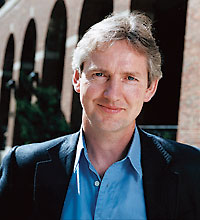 Widely considered one of the world’s leading sociologists of crime and punishment, Garland joined the NYU faculty from Edinburgh University. His publications on the sociology of punishment, penal policy, and criminological theory can be found on course syllabi from Amherst, Massachusetts, to Adelaide, Australia. He was the founding editor of the interdisciplinary journal Punishment & Society and is currently on the board of The British Journal of Sociology and the journal Law and Social Inquiry. In addition to his Arthur T. Vanderbilt chair at the Law School, he holds a full professorship in the NYU Department of Sociology.
Widely considered one of the world’s leading sociologists of crime and punishment, Garland joined the NYU faculty from Edinburgh University. His publications on the sociology of punishment, penal policy, and criminological theory can be found on course syllabi from Amherst, Massachusetts, to Adelaide, Australia. He was the founding editor of the interdisciplinary journal Punishment & Society and is currently on the board of The British Journal of Sociology and the journal Law and Social Inquiry. In addition to his Arthur T. Vanderbilt chair at the Law School, he holds a full professorship in the NYU Department of Sociology.
Over the last academic year, Garland’s preeminence in the field was definitively affirmed by three separate academic conferences honoring his work. In September 2003, the Scottish Criminology Conference celebrated the 20th anniversary of the publication of The Power to Punish, the seminal book edited and, in part, authored by Garland. As he explains, the book laid out a program for the development of a new sociology of punishment and identified the key issues, ideas, and arguments that have come to define this area. Twenty years later, the conferees assessed what has been accomplished, mounting a retrospective of scholarship in this field, much of which was influenced by Garland’s prizewinning studies Punishment and Modern Society: A Study in Social Theory (1990) and Punishment and Welfare: A History of Penal Strategies (1985).
Later that same month, the University of York’s biennial conference on political theory was entirely devoted to a discussion of Garland’s tour de force, The Culture of Control: Crime and Social Order in Contemporary Society (2001). The book charts important changes in the social response to crime in the United States and Britain over the past 25 years and offers a sociological explanation of how we came to rely on mass imprisonment and a pervasive culture of control to deal with the risks and insecurities that are part of contemporary social organization. In March 2004, there was a third conference honoring Garland’s work when 400 delegates met at the Universitá degli Studi di Milano-Bicocca to mark the publication of an Italian edition of The Culture of Control, and to hear several of Italy’s leading scholars and jurists discuss its relevance to Italy and other contemporary societies.
The Culture of Control’s interpretation of the current scene is grounded in a detailed empirical knowledge of how the criminal justice system works, together with a broad grasp of the social forces shaping everyday life. Because of its broad range and synthesizing vision, the book has resonated in many different countries and in many different fields of scholarship. To date, it has generated more than 60 reviews in scholarly journals, authormeets- critics sessions at several conferences here and abroad, and a forthcoming book—Politics and the Culture of Control, edited by Matt Matravers—in which other scholars comment on or take issue with its theses.
Garland is currently studying the American system of capital punishment, showing how its specific form and character have been produced by America’s distinctive governmental structures, political history, and cultural conflicts. He seeks to explain why, even though most Western countries abolished the death penalty in the 1960s, the United States continues to execute offenders. Garland rejects the prevailing view that American culture is somehow predisposed toward a punitive response to crime, and argues instead that explanations need to focus upon the specific institutional features of American law and government, and a detailed history of the political and cultural currents that operate through them.
Just as Garland’s scholarship is enriched by the dual perspectives of law and sociology, he enjoys interacting in the classroom with both law students and sociology graduate students. “My sociology grad students are training to be academics: they will write dissertations and make careers in the areas that I teach, so they tend to have a deep and long-term engagement with the issues,” Garland says. “But it’s also exciting to listen to the law students in my seminars on the death penalty, prison law, or sentencing. Many have real, practical experience or detailed policy knowledge in criminal justice. When they bring these perspectives to bear they usually stimulate a terrific classroom dialogue.”
Professor James Jacobs: Godfather of the Department
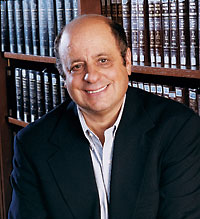 Professor James Jacobs is a prolific and creative legal scholar. Beginning with his 1977 sociology dissertation, Stateville: The Penitentiary in Mass Society, which is still the classic monograph on the social and legal transformation of the prison in post-World War II America, through his recent book Can Gun Control Work? (Oxford University Press, 2002), which provoked nationwide debate on U.S. gun laws, Jacobs has produced thoughtful work on an extraordinary range of subjects. In addition to scores of articles, he has written 15 books covering topics like prisoners’ rights, civil-military relations, drunk driving, public corruption, organized crime, hate crimes, and gun control. Jacobs describes his work as “driven from the ground up” he says. “I don’t come to a subject with a preformed ideological framework. My approach to scholarship is sociological, criminological, empirical, and policy- oriented.” Incorrigibly curious and original in his thinking, Jacobs’ interests typically take him ahead of scholarship trends.
Professor James Jacobs is a prolific and creative legal scholar. Beginning with his 1977 sociology dissertation, Stateville: The Penitentiary in Mass Society, which is still the classic monograph on the social and legal transformation of the prison in post-World War II America, through his recent book Can Gun Control Work? (Oxford University Press, 2002), which provoked nationwide debate on U.S. gun laws, Jacobs has produced thoughtful work on an extraordinary range of subjects. In addition to scores of articles, he has written 15 books covering topics like prisoners’ rights, civil-military relations, drunk driving, public corruption, organized crime, hate crimes, and gun control. Jacobs describes his work as “driven from the ground up” he says. “I don’t come to a subject with a preformed ideological framework. My approach to scholarship is sociological, criminological, empirical, and policy- oriented.” Incorrigibly curious and original in his thinking, Jacobs’ interests typically take him ahead of scholarship trends.
His book on gun control is a prime example, anticipating the recent flurry of interest in this topic. In researching Can Gun Control Work? Jacobs first spent time learning how guns actually operate and who owns and uses guns, concluding that complete disarmament is not a realistic option for the United States. He next looked at the history of gun control in this country, deducing from the statistical evidence that gun control has not made, and is unlikely to make, a noticeable dent in violent crime. Refusing to align himself with any one political perspective, Jacobs examined the various existing and proposed gun controls, refocusing the debate on sensible strategies for reducing gun-related crime. He reached conclusions that annoyed both gun rights’ advocates (gun shows are impossible to police and should probably be banned outright), as well as anti-gun activists (a ban on handguns would be just as impossible to enforce as our drug laws).
Jacobs’ unapologetic distaste for absolutes and abstractions makes it difficult to pigeonhole his view on any particular issue, with the result that both sides of the political divide have had occasion to blacklist him. When former President Bill Clinton convened a White House conference on hate crime, the U.S. Department of Justice invited Jacobs to attend, but later rescinded the invitation under pressure from activists who did not want the creation of hate-crime categories questioned. Similarly, during the Reagan administration’s campaign against drunk driving, the National Institutes of Health were not allowed to cite Jacobs’ book on drunk driving because he is not categorically in favor of deterrence and punishment as a strategy. Not surprisingly, Jacobs has never testified before Congress. “I’m not a campaigner or a politician,” he says. But people in power pay attention to what he has to say.
Jacobs’ latest work focuses on labor racketeering, which in his view “stands at the intersection of two powerful 20th-century institutions—organized crime and organized labor.” Jacobs has been revisiting the issue of organized crime since the mid-1980s, fascinated by the strength of its position in the country’s economic and political power structure. In writings such as Busting the Mob in 1994, and Gotham Unbound: How New York City was Liberated from the Grip of Organized Crime in 1999, both published by NYU Press, he has documented and analyzed law enforcement’s attack on the Mafia, focusing on the systematic purging of crime families, with hundreds of mobsters sent to prisons and the major crime families in most cities rendered dysfunctional. Jacobs finds it remarkable that so few scholars have shown any interest in this massive legal campaign. “This is not what stimulates most criminal law scholarship in the U.S.,” Jacobs says. “Most criminal law academics are more interested in civil liberties issues, are more doctrinally oriented toward what the Supreme Court does.”
In turning his attention to mobbed-up unions for his new book, Organized Crime & Organized Labor, to be published next year, Jacobs hopes to illuminate the impact of organized crime on the labor movement and on U.S. politics. He is also taking a close look at the Racketeer Influenced and Corrupt Organizations Act (RICO) lawsuits launched against labor racketeering, 19 of which have already resulted in the appointment of trustees to purge the mob and restore democracy in local, regional, national, and international unions. One example is the trusteeship over the Teamsters, the country’s largest private union, with 530 union leaders purged since 1989. This litigation crusade “is one of the great episodes of court-ordered reform in the history of American law,” Jacobs says, “and no one is writing about it.” Nor is anyone evaluating its efficacy, according to Jacobs. After 20 years of a “massive experiment in directed sociopolitical change,” he has found that “very little is known about what works and what does not work, or even about what court-appointed trustees in union reform cases actually do.”
Jacobs’ teaching schedule is no less energetic. He regularly takes the lectern in the first-year criminal law course and the upper-level criminal procedure course as well as teaching Federal Criminal Law and Juvenile Justice courses. He has designed and taught more than a half-dozen different seminars through the years in subjects ranging from sentencing to the drug war. He was recently inducted into the American Society of Criminology, and his seminars reflect his multidisciplinary approach to subjects in criminal law. In a class called The Regulation of Weaponry in a Democratic Society, he explores whether gun control is bad for women. In his Labor Racketeering and Union Democracy seminar, students read an analysis of corruption and racketeering in the New York City construction trades. “The reason I took a class with Professor Jacobs,” says Weston Eguchi (’04), “is that he does not let us make any unchallenged assumptions about a subject.” In the Winter/Spring 2005 semester Professor Jacobs and Adjunct Professor Ronald Goldstock will be launching a new seminar on Privatization in Criminal Justice, dealing with private police, private investigations firms, private prisons, and private dispute settlement (through restorative justice mechanisms).
Professor Jerome Skolnick: A Life of Crime
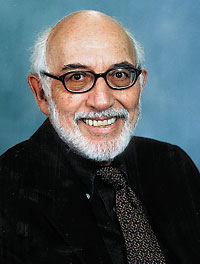 Professor Jerome Skolnick’s seminars on policing and on the regulation of vice also take a nuanced approach, probing the history, sociology, and politics that underlie the law. Although honored for his scholarship by just about every major criminal law and justice organization, Skolnick likes to point out that he is not a lawyer. A native New Yorker, Skolnick’s career path has included sojourns writing an award-winning moral philosophy dissertation at the City College of New York and a groundbreaking family law casebook while teaching at Yale Law School, serving in an Army Reserve’s South Asia strategic intelligence unit, and winning a National Science Foundation grant to gather materials for his book-length study of the regulation of casino gambling in Nevada. Skolnick spent most of his academic career at the University of California at Berkeley where he was the director of the Center for the Study of Law and Society.
Professor Jerome Skolnick’s seminars on policing and on the regulation of vice also take a nuanced approach, probing the history, sociology, and politics that underlie the law. Although honored for his scholarship by just about every major criminal law and justice organization, Skolnick likes to point out that he is not a lawyer. A native New Yorker, Skolnick’s career path has included sojourns writing an award-winning moral philosophy dissertation at the City College of New York and a groundbreaking family law casebook while teaching at Yale Law School, serving in an Army Reserve’s South Asia strategic intelligence unit, and winning a National Science Foundation grant to gather materials for his book-length study of the regulation of casino gambling in Nevada. Skolnick spent most of his academic career at the University of California at Berkeley where he was the director of the Center for the Study of Law and Society.
Skolnick offers a distinctive sociological perspective on criminal law and its administration, befitting the former president of the American Society of Criminology and board member of the American Sociological and Law and Society Associations. He is probably best known for his classic book Justice Without Trial, which examines how the subculture of the police influences their enforcement of the criminal law. For the better part of 30 years, Skolnick has been recognized internationally as a premier expert on democratic policing. His theories of police integrity and accountability, most recently developed in his book Above the Law with James J. Fyfe (currently the New York City Police Department’s Deputy Commissioner for Training) continue to provide a framework that defines the research in this field, most notably in recent examinations of excessive force by police racial profiling practices. “The issue of racial profiling offers an example of how the Law School, and in particular the Center for Research in Crime and Justice, pulls together diverse interests in the criminal justice area to influence scholarship on a subject,” Skolnick says. Recollecting his interactions with Thomas Tyler, NYU professor of psychology, at Center events, Skolnick gratefully acknowledges the debt his current work owes to Tyler’s seminal studies on what makes a society law-abiding and how practices such as racial profiling undermine police legitimacy and compliance with law.
Skolnick also credits the Law School’s new Center on Law and Security for advancing the interdisciplinary approach to issues in criminal law. A regular last year at the Center’s colloquia on the legal dimensions of counterterrorism, Skolnick is interested in terrorism as a special type of crime, concentrating police resources into international intelligence, risk prevention, and post-attack planning. “Crime prevention typically involves community relations, targeting high-crime areas, things the police are already doing,” Skolnick says. “How does and should this differ when conpolice are expected to prevent and respond to terrorist acts?” The exchange of ideas stimulated by the Center influenced Skolnick’s recent thinking and research into the role of the law enforcement authorities in national security efforts. Skolnick has recently written two papers on torture and interrogation. “On Controlling Torture” was published last year in a volume edited by Stanley Cohen and Thomas Blomberg. Skolnick’s paper “American Interrogation: From Torture to Trickery” is about to be published in an Oxford University Press book on torture, edited by Sanford Levinson with a forward by Ariel Dorfman.
International Dimensions
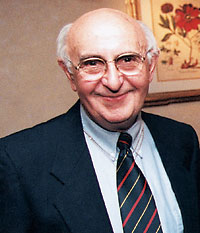 Criminal law intersects with many other specialties of law, and many would say this reality is personified in Professor Theodor Meron as he stands at the crossroads of human rights, humanitarian, criminal and international law. A 25-year veteran of the faculty, Meron is currently on leave serving as president of the International Criminal Tribunal for the former Yugoslavia, headquartered at The Hague, Netherlands. This appointment caps off a venerable career in international public service, including his time in the Israeli Foreign Service in the 1970s and, since then, as an active member of the Organization for Security and Cooperation in Europe, the Council on Foreign Relations, and the International Committee of the Red Cross. Along with being a forceful presence on the international stage, Meron has written prolifically on human rights, humanitarian law, and international criminal law.
Criminal law intersects with many other specialties of law, and many would say this reality is personified in Professor Theodor Meron as he stands at the crossroads of human rights, humanitarian, criminal and international law. A 25-year veteran of the faculty, Meron is currently on leave serving as president of the International Criminal Tribunal for the former Yugoslavia, headquartered at The Hague, Netherlands. This appointment caps off a venerable career in international public service, including his time in the Israeli Foreign Service in the 1970s and, since then, as an active member of the Organization for Security and Cooperation in Europe, the Council on Foreign Relations, and the International Committee of the Red Cross. Along with being a forceful presence on the international stage, Meron has written prolifically on human rights, humanitarian law, and international criminal law.
Having traveled in his life from a Nazi labor camp in Poland to the NYU School of Law, Meron was profiled earlier this year in The New York Times as a dedicated scholar who is passionate about the principles of humanitarian law and the quest to avoid the worst excesses of war. (Please see the reprinted article on page 99.) He believes that the Hague tribunal will serve as a model for dispensing international justice for such courts as the International Criminal Court. More important, Meron believes the tribunal marks a growing international acceptance that the world must reckon with war crimes and other massive human rights abuses. As he told the Global Policy Forum earlier this year, “The tribunal serves an essential role in the region itself by showing the victims of those terrible crimes that, in fact, some of the principal offenders will not go unpunished, that there is accountability, that it really presents an opportunity to put an end, in a some way, to this notion of impunity which has plagued the international community for such a long time.”
Although Meron’s schedule does not permit a full-time teaching load, he continues to supervise student work, including J.S.D. candidates working on dissertations in international criminal law. He also exercises his teaching muscles, delivering the general course on public international law at the Hague Academy this past year, a wide-ranging discourse on the law of war and the criminalization of international humanitarian law, also published in book form as International Law in the Age of Human Rights.
The healthy flow of international visitors is also augmented by the Hauser Global Law School Program, which every year sponsors up to 20 leading foreign law professors and judges from around the world to teach at the NYU School of Law, routinely offering a compelling perspective on worldwide administration of criminal justice. The Law School’s preeminence in the field of international criminal law is epitomized by such distinguished visitors as Richard Goldstone, a retired justice of the Constitutional Court of South Africa, which supervised the country’s transition to democracy. Goldstone periodically teaches a seminar at the Law School on the Law of War and International Criminal Courts, which draws on his remarkable career in the enforcement of international humanitarian law. From 1991 to 1994, he served as Chairperson of the South African Commission of Inquiry regarding Public Violence and Intimidation, which came to be known as the Goldstone Commission. Later career milestones have spanned the globe; from 1994-96, Goldstone served as the chief prosecutor of the U.N. International War Crimes Tribunals for the former Yugoslavia and Rwanda; from 1999-2001, he was chairperson of the International Independent Inquiry on Kosovo; and finally, from 2002-03, he served as co-chair of the International Bar Association’s Task Force on International Terrorism.
Current Global Law Faculty member Nicola Lacey, professor of criminal law at the London School of Economics, has taught Legal Punishment: Philosophy and Practice during her visits, examining the institution of legal punishment from wide-ranging philosophical and sociological perspectives, with readings in political theorists such as Jeremy Bentham, H.L.A. Hart, Michel Foucault, and John Braithwaite, who himself was a visiting professor at the Law School in 2001. Lacey’s interdisciplinary scholarship draws on several fields—criminal law doctrine, criminology and criminal justice studies, feminist theory, and political philosophy—all of which she applied to research on moral blaming and judgments of guilt in criminal law, conducted in part during her visits to the Law School. She also participated in “Our Community’s Response to September 11, 2001,” on the first anniversary of the attack, delivering a talk on “Civil Liberties in the Face of Terrorism and Problems of Punishment: The Experience in Other Countries.”
The Hauser Global Law School Program also hosts a steady stream of events and sponsors numerous projects and initiatives, many bearing on issues in international criminal law such as the Project on Transitional Justice, directed by Professor Alexander Boraine, former vice chair of South Africa’s Truth and Reconciliation Commission. Boraine’s project is the first systematic effort to combine intellectual and practical approaches to the new field of “transitional justice,” which studies how countries are moving from authoritarian rule to democracy.
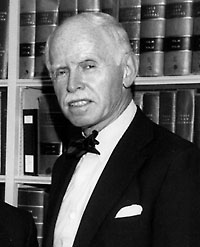 The Law School’s full-time faculty also boasts Professor Jerome Cohen, an expert in East Asian studies, international business transactions, comparative law, and international law. At Harvard University and, since 1991, at NYU, Cohen helped pioneer the introduction of East Asian legal systems and perspectives into the United States’ legal curricula. Considered the leading American scholar of Chinese law, Cohen, assisted by Taiwan-born legal scholar Ping Yu, teaches a course on Chinese law and society that is consistently overbooked.
The Law School’s full-time faculty also boasts Professor Jerome Cohen, an expert in East Asian studies, international business transactions, comparative law, and international law. At Harvard University and, since 1991, at NYU, Cohen helped pioneer the introduction of East Asian legal systems and perspectives into the United States’ legal curricula. Considered the leading American scholar of Chinese law, Cohen, assisted by Taiwan-born legal scholar Ping Yu, teaches a course on Chinese law and society that is consistently overbooked.
In addition to his many efforts to assist in the successful integration of China’s burgeoning economy into international markets, Cohen is increasingly involved in criminal defense work. In cases that could be seen as the inevitable result of the clash between China’s new openness and its powerful and corrupt bureaucracies, Cohen has found himself serving as counsel in a number of high-profile cases involving China’s illegal detention of American-based Chinese scholars and U.S. businessmen of Chinese ethnic descent.
The enormous difficulties facing criminal defense lawyers in China have become a recurring theme in Cohen’s public lectures. This focus on China’s criminal justice system is just the latest twist in his career-long exploration of the extent to which China’s traditional legal culture presents an obstacle to modernization. In the last year, he has addressed university audiences in Hong Kong on China’s use of the death penalty, in Shanghai on Chinese perspectives on corporate fraud and governance, and in Beijing on U.S. criminal law. Accompanied on these visits by Law School reinforcements, including Professors Jacobs, Skolnick, and Stevenson, Cohen hopes to establish an ongoing dialogue with their Chinese counterparts in criminal law and criminal procedure.
Given the impact of a nation’s criminal justice system on foreign relations, many of the foreign students who study at the Law School every year, including the specially selected Hauser Global Law Scholars and the Global Public Service Law Scholars, are engaged in serious scholarship in criminal law topics. They are drawn to the NYU School of Law to exchange ideas and have their work reviewed by the faculty equivalent of a world-class editorial board. Millie Odhiambo (’01), a former state attorney for Kenya, grabbed this opportunity when she came to NYU to study international human rights law and comparative criminal law. Working with Holly Maguigan, professor of clinical law and a faculty director of the Global Public Service Law Project, Odhiambo engaged in a case study on using public interest law to vindicate women’s rights in Kenya in the area of domestic violence. As a result, Odhiambo was awarded a Global Public Service Fellowship to work with the Children’s Legal Aid Network in Nairobi, where she developed a family and juvenile court manual for indigent clients and wrote “best practices” guidelines to assist legal aid clinics addressing family law issues.
The international reverberations of the NYU School of Law’s criminal law program are epitomized by Arun Thiruvengadam (LL.M. ’02, J.S.D. ’05), a law professor from India who is visiting the Law School to write his doctoral thesis on comparative constitutional law. In the early 1990s, he was a member of the third graduating class of the National Law School of India University, studying at a time of tremendous intellectual excitement about the law in India. After practicing and teaching law in India and working on significant public interest litigation there, Thiruvengadam says he had grown skeptical of the judiciary and courts as mechanisms for bringing about social change in India. He decided that he needed to expand his thinking about the law in a program with a strong comparative law focus. At the NYU School of Law, he says, “I experienced excitement about the law again.” After completing a one-year LL.M. degree, he was awarded a Global Public Service Law Scholarship to pursue his J.S.D. “I was convinced to continue my studies by the level of academic inquiry at NYU and the opportunities to interact with scholars from all over the world.”
For Thiruvengadam, his semester in the Comparative Criminal Justice Clinic was a turning point. He won an award for his work at the clinic, which primarily involved helping represent an undocumented alien who seriously injured her boyfriend in alleged self-defense, fled to Jamaica after the attack, and was ultimately extradicted back to the United States to stand trial.Thiruvengadam’s efforts on her behalf included substantive research into the law of extradition, mental competency, and the admissibility of foreign confessions, as well as participation in pretrial criminal law practice ranging from factual investigation to hearings on discovery and evidentiary matters. His experiences in the clinic, and his sense of the Law School’s overall commitment to public service, gave him focus for his eventual return to the legal academy in India. “I hope to found a public interest law center in India, modeled on the one at NYU, to provide the training, counseling, job opportunities, and financial support necessary to develop career paths in public interest law,” he says.
U.S. students interested in international criminal law similarly have access to transformative learning experiences, including positions as interns at the U.N. International Law Commission or as judicial assistants at the International Court of Justice at The Hague. The Law School has also sponsored students for clerkships with the Court of Justice of the European Communities in Luxembourg, the Constitutional Court of South Africa, and the Interamerican Court of Human Rights. These clerkships with foreign and international courts, which are constantly being expanded, reflect the Law School’s determination to broaden the global opportunities available to students interested in criminal law.
Center on Law and Security
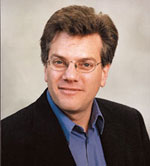 Since September 11, 2001, constitutional democracy in the United States has had to confront legal issues regarding national security and policing that present completely novel questions. The expertise that exists on these issues is overwhelmingly concentrated in New York City. The NYU School of Law’s Center on Law and Security, funded by a grant from the U.S. Department of Justice, is a research and policy program that fulfills a dire need for information, scholarship, policy advice, and debate on counter-terrorism and peace-keeping, the critical legal areas of our times. Richard Pildes, the Sudler Family Professor of Constitutional Law, a Center faculty co-director and a specialist in legal issues affecting democracy, sees the Center as an example of how scholarship at the NYU School of Law is concerned with practical relevance. The challenge of the age of terror for legal scholars, Pildes says, is “to take the structures, principles, and values developed in other contexts and make sense of them in this new context.”
Since September 11, 2001, constitutional democracy in the United States has had to confront legal issues regarding national security and policing that present completely novel questions. The expertise that exists on these issues is overwhelmingly concentrated in New York City. The NYU School of Law’s Center on Law and Security, funded by a grant from the U.S. Department of Justice, is a research and policy program that fulfills a dire need for information, scholarship, policy advice, and debate on counter-terrorism and peace-keeping, the critical legal areas of our times. Richard Pildes, the Sudler Family Professor of Constitutional Law, a Center faculty co-director and a specialist in legal issues affecting democracy, sees the Center as an example of how scholarship at the NYU School of Law is concerned with practical relevance. The challenge of the age of terror for legal scholars, Pildes says, is “to take the structures, principles, and values developed in other contexts and make sense of them in this new context.”
“We serve as an educational and informational resource for anyone interested in the legal dimensions of counterterrorism,” says Karen Greenberg, the Center’s executive director. “We have interacted with the Homeland Security Department, the CIA, the NYPD, Scotland Yard, many of President Clinton’s former advisers, the staffs of numerous Congressmen and Senators, the RAND Corporation, the Manhattan Institute, and the Brookings Institution, to name a few.” These exchanges often take place in open forums where the well-informed participants—decisionmakers themselves—examine the current legal debate over counterterrorism. Examples from the Fall semester include Guantánamo: The Supreme Court Cases and the Extent of U.S. Power Over “Illegal Combatants”—What Will It Mean?, The USA Patriot Act: Where Do We Go From Here? and Al Jazeera: Propaganda or Investigative Journalism? The Center even hosted an advance screening of the controversial documentary Uncovered: The Whole Truth About the Iraq War. The Center also collaborates with organizations and agencies engaged in the war on terror, including working with the NYPD’s counterterrorism personnel, to contribute fresh thinking on how to moderate law enforcement reaction in crisis situations.
 Professor Stephen Holmes’s work also pushes the boundaries as he explores the hot new field of national security law, in particular its connection to international relations and the enforcement of international criminal law. With degrees in philosophy and political science, Holmes is a specialist on the history of European liberalism and on legal change in Eastern Europe and Russia after communism. His latest work focuses on the evaluation of efforts by institutions, such as the World Bank, to promote the “rule of law” in transitional and developing countries, and on the global implications of antiterrorism measures. As a faculty co-director of the Center on Law and Security, he brings his legal and historical acumen to scholarship involving the apprehension and punishment of terrorists. This year, his students will get a taste of this interdisciplinary framework in his Political Trials: Dilemmas of International Criminal Law seminar.
Professor Stephen Holmes’s work also pushes the boundaries as he explores the hot new field of national security law, in particular its connection to international relations and the enforcement of international criminal law. With degrees in philosophy and political science, Holmes is a specialist on the history of European liberalism and on legal change in Eastern Europe and Russia after communism. His latest work focuses on the evaluation of efforts by institutions, such as the World Bank, to promote the “rule of law” in transitional and developing countries, and on the global implications of antiterrorism measures. As a faculty co-director of the Center on Law and Security, he brings his legal and historical acumen to scholarship involving the apprehension and punishment of terrorists. This year, his students will get a taste of this interdisciplinary framework in his Political Trials: Dilemmas of International Criminal Law seminar.
The Center on Law and Security’s main initiative since its creation in 2003 has been the Program on Law and Security, led by the Center’s four co-directors— Professors Noah Feldman (author of After Jihad: America and the Struggle for Islamic Democracy), David Golove, Stephen Holmes, and Richard Pildes. The Center convenes policy-makers, law enforcement officials, and scholars who discuss and make recommendations on security issues, including the rules and regulations of information sharing among agencies; the role of international organizations in rebuilding Iraq; democracy and Islam; preparedness in New York City and other urban areas nationwide and abroad; international codes for apprehension and punishment of terrorists; and secrecy in government and the media. As might be expected, criminal justice themes reverberate throughout the Programs’ efforts, which include study of the legal framework for investigating terrorism, law enforcement methods at home and overseas, the challenge posed by international collaboration in the prosecution of terrorists, and constructing a security apparatus for new democracies. As evidence of the Center’s relevance, it is worth mentioning that last year Holmes, and this year Pildes, were selected for the prestigious Carnegie Scholar grant—the first time a law school’s faculty has been chosen two years in a row.
[SIDEBAR: Constitutional Scholars Debate Guantánamo Bay Detentions]
To carry out the Program on Law and Security, the Center has embarked on an ambitious project called the Colloquium on Law and Security, which gathers law students, faculty members, and interested guests on a weekly basis to delve into the issues and current state of the debate over specific topics in counterterrorism. Last fall, the colloquium was run by Professors Holmes and Pildes. Guest speakers have included noted Middle East scholar Rohan Gunaratna on Al Qaeda’s global network of terror; Daniel Benjamin, senior fellow in the International Security Program at the Center for Strategic and International Studies on the current war on terror; Jack Goldsmith, then the Assistant U.S. Attorney General for the Office of Legal Counsel, who is an expert on U.S. civil litigation and international terrorism; and William Wechsler, former director for transnational threats at the National Security Council, on cutting off terror financing. With required readings posted on the Center’s Web site, the colloquium brims with dialogue and debate. This intellectual exchange is at the core of the Center’s mission of facilitating discussion across borders, professions, and perspectives as to how to fight the war on terror. “As we implement our program,” Pildes says, “I can see the Center making special policy recommendations or assisting in designing new institutional structures such as special terrorism courts.”
In addition, the Center hosts two major conferences each year. The one held in November 2003, “Are We Safer? Transformations in Security After September 11,” discussed how to resolve the tension between civil liberties and the need to gird our national security. The other, held in June 2004, gathered antiterrorism experts for two days of intense talk at NYU’s La Pietra campus in Florence. (Please see full story on page 57.)
What Karen Greenberg, the Center’s executive director, has been gratified to learn is that no side of the debate on antiterrorism has a monopoly on respect for the law. Despite how the media reports on the Patriot Act, Greenberg believes that “law enforcement officials, including in the Bush administration, are hesitant to bend the law to accommodate hysteria about terrorism. They have respect for the law and for their profession and are struggling with these issues as much as anyone.”
The Center also sponsors research and scholarship in counterterrorism topics, such as Golove’s and Holmes’ article on terrorism and accountability, published in the Center’s quarterly review. Holmes has also been widely published in journals such as The Nation, The London Review of Books, and the website Salon.com. Rarely has serious legal scholarship so quickly been converted into meaningful policy discussion.
The same could be said of Pildes’ work on the processes of democratic discussion and decision-making within the three branches of government as they each struggle to delimit and deploy the tools of counterterrorism. A frequent commentator on the intersection of domestic and international legal institutions, Pildes recently published “Conflicts Between American and European Views of Law: The Dark Side of Legalism” in the Virginia Journal of International Law. He has shared his scholarship on domestic institutional handling of terrorism cases with gatherings of federal judges, organized by the Law School’s Institute of Judicial Administration. These types of efforts to assist policy-makers, government officials, think tanks, and the media are extended through the Center’s online reading lists and reference materials, including such topics as civil liberties issues, bioterrorism, and ethno-territorial minorities in Western Europe.
Opportunities for student involvement extend beyond the Center’s colloquium and other public events. Each summer, the Center helps support Law School students whose internships are connected with counterterrorism, either on a domestic or a global level. These internships facilitate the development of informed next-generation leaders who can address the issues of counterterrorism with a depth of knowledge and a wealth of experience. Meg Holzer (’05) spent part of her first law school summer as an intern at the Organization for the Prohibition of Chemical Weapons in The Hague. She assisted in information dissemination about the importance of the Chemical Weapons Convention, in operation since 1998, including the treaty’s ban on chemical weapons and its goal of encouraging peaceful uses of chemistry. Each summer a student from the NYU School of Law is selected for an internship at Interpol in Lyon, France. The Center also recently announced a new postgraduate fellowship, the Fellowship in Global Counterrorism at Interpol. Sheridan England (’04) is the first and current fellow. He is working in the Office of Legal Affairs at the agency’s offices in Lyon.
Brennan Center’s Criminal Justice Program
The still-developing Criminal Justice program at the NYU School of Law’s Brennan Center for Justice provides a muchneeded outlet for practical advocacy. Part public interest law firm, part think tank, and part advocacy organization, the Program has pursued diverse projects under the leadership of Professor Stephen Schulhofer and the program’s director Kirsten Levingston. The Program challenges popular assumptions about crime and punishment through careful analyses of criminal justice policy and practices, and concerted action to effect reform. Its work thus far centers on effective assistance of counsel, the fair enforcement of the criminal law, and crime and punishment.
The Program’s flagship project is the Community Justice Institute (CJI), a resource for community groups, activists, and defenders working to improve policies at the local, state, and national levels. In designing the Institute, Levingston works to move private and public criminal defense practitioners from political isolation to more active involvement in communities. The Institute addresses the increasing alienation experienced by lowincome communities as a consequence of criminal justice practices, such as “community policing,” that often ignore the views of the communities they purport to protect. Using a methodology known as “community-oriented defense,” the Institute encourages the development of partnerships among community organizations— like schools, churches, and social service agencies—and their local indigent defense service providers, so that they might jointly identify mutual concerns and aspirations.
[SIDEBAR: On Leave for a Noble Cause]
The Brennan Center strives to elevate community voices in the courtroom through its Community Amicus Practice. Using amicus procedures, the Center files briefs in local prosecutions that have policy implications beyond the case at hand, raising issues that the parties may not otherwise bring to the fore. The Center partnered with the Seattle-King County Public Defender’s Office to file an amicus brief in State of Washington v. Lonnie McKinney, on behalf of criminal defense lawyers in the state of Washington contesting the random running of license plates by law enforcement officers. The brief argued that the practice should be unconstitutional because it entails the exercise of infinite officer discretion, which can lead to racially-biased policing. Although running license plates based on a traffic violation or reasonable suspicion of criminal activity may be a reliable police practice, the brief argued that the Washington state constitution protects its citizens’ privacy interests from government “fishing expeditions.”
The Center also submitted an amicus brief on behalf of 100 Blacks in Law Enforcement Who Care, an advocacy group, in People v. Glenn, urging the New York Court of Appeals to maintain its longstanding prohibition against illegitimate traffic stops, in which police claim to stop motorists for a traffic violation but instead are interested in investigating other activity. Partnering with lawyers at Schulte, Roth & Zabel, the Brennan Center filed an amicus brief in the U.S. Supreme Court in HUD v. Rucker, a case challenging the U.S. Department of Housing and Urban Development’s “one-strike” policy. Under this policy, public housing authorities may evict tenants and their families if a family member or guest engages in criminal or drug activity, on or off the public housing premises, even if the tenants did not know about the activity.
In its monthly Conversation Series, the Brennan Center has touched on many other important criminal justice themes, such as the status of female offenders and the collateral consequences of mass imprisonment. A conversation held in 2003 featuring Dr. Paul Street, vice president of research and planning for the Chicago Urban League, illuminated the contrast between the massive public, media, and policy-maker attention given to welfare reform and the virtual neglect of racially disparate mass incarceration and felony-marking. Street’s talk explored the direct and indirect social, economic, and political damage inflicted on U.S. communities of color by mass incarceration, including its impact on the census, voting power, and budget allocation. Lectures like this pull in students as well as practitioners and policy-makers.
Stephen Schulhofer: Voice of Reason
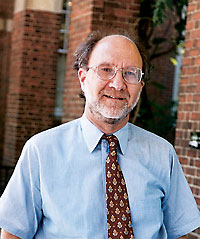 Stephen Schulhofer, the Robert B. McKay Professor of Law, finds the Brennan Center’s research support indispensable to his work on civil liberties and the war on terrorism, including his recent contributions to amicus briefs in the Korematsu and Guantánamo Bay prisoner rights cases in the U.S. Supreme Court. Research assistance funded by the Brennan Center laid the foundation for much of the briefs’ historical review of U.S. civil liberties violations during wartime. Fred Korematsu first appeared at the U.S. Supreme Court during World War II when he refused, as an American citizen of Japanese descent, to be interned. He was prosecuted and convicted at the time, only to have his conviction thrown out decades later, and to be awarded the Presidential Medal of Freedom. Korematsu stepped forward again last year on behalf of military detainees being held without charge or access to counsel to argue that the United States must “respect the principle that individuals may not be deprived of their liberty except for appropriate justifications that are demonstrated in fair hearings.”
Stephen Schulhofer, the Robert B. McKay Professor of Law, finds the Brennan Center’s research support indispensable to his work on civil liberties and the war on terrorism, including his recent contributions to amicus briefs in the Korematsu and Guantánamo Bay prisoner rights cases in the U.S. Supreme Court. Research assistance funded by the Brennan Center laid the foundation for much of the briefs’ historical review of U.S. civil liberties violations during wartime. Fred Korematsu first appeared at the U.S. Supreme Court during World War II when he refused, as an American citizen of Japanese descent, to be interned. He was prosecuted and convicted at the time, only to have his conviction thrown out decades later, and to be awarded the Presidential Medal of Freedom. Korematsu stepped forward again last year on behalf of military detainees being held without charge or access to counsel to argue that the United States must “respect the principle that individuals may not be deprived of their liberty except for appropriate justifications that are demonstrated in fair hearings.”
As part of its ongoing efforts to bring moderation to debates on tactics deployed in the name of counterterrorism, the Center on Law and Security hosted “The USA Patriot Act: Where Do We Go From Here?” The event featured Schulhofer and Alice Fisher, partner in the litigation department of Latham & Watkins and former deputy assistant attorney general of the U.S. Department of Justice Criminal Division, and was moderated by Tom Gerety, executive director of the Brennan Center for Justice.
In Fisher’s view, the Patriot Act has unjustifiably become “the bogeyman for civil libertarians,” mischaracterized as privacy- invading and rights-denying despite full congressional and judicial oversight of its implementation. Schulhofer responded with the argument he has made in his book The Enemy Within and in his testimony before the National Commission on Terrorist Attacks Upon the United States (the 9-11 Commission): “The legal issues concerning the scope of the Patriot Act are much less important than people on either side of the debate think.” The main obstacles to effective counterterrorism efforts, Schulhofer says, “are agency culture; human deficits; and budgetary, technological, and organizational deficits that prevented our national security apparatus from using the legal tools they had.” He pointed out that federal law enforcement authorities had identified Zacharias Moussaoui as a risk before September 11 and even had legal authority to search his computer, “but they dropped the ball.”
Since then, many legal experts have been saying that to fight terrorism we need to shift the balance between liberty and security. This analysis is misguided, Schulhofer says, and diverts us from more important needs like upgrading technology, improving training and communications, and resetting law enforcement priorities. Although conceding that some aspects of the Patriot Act were helpful and inoffensive, Schulhofer asserted that there have been “more than a dozen initiatives since 9/11 that impair freedom and are not relevant to fighting terrorism.” In his view, maximizing security does not require more surveillance laws; it requires more resources to protect soft targets like ports, chemical plants, and weapons facilities.
In the long run, according to Schulhofer, it is more critical to the U.S.’s national security that it uses its power responsibly and consistently with the rule of law. He sees overbroad and invasive counterterrorism measures as “purchasing short term gains at the price of fostering animosity of recent immigrants, Muslims abroad, and democratic nations everywhere.”
